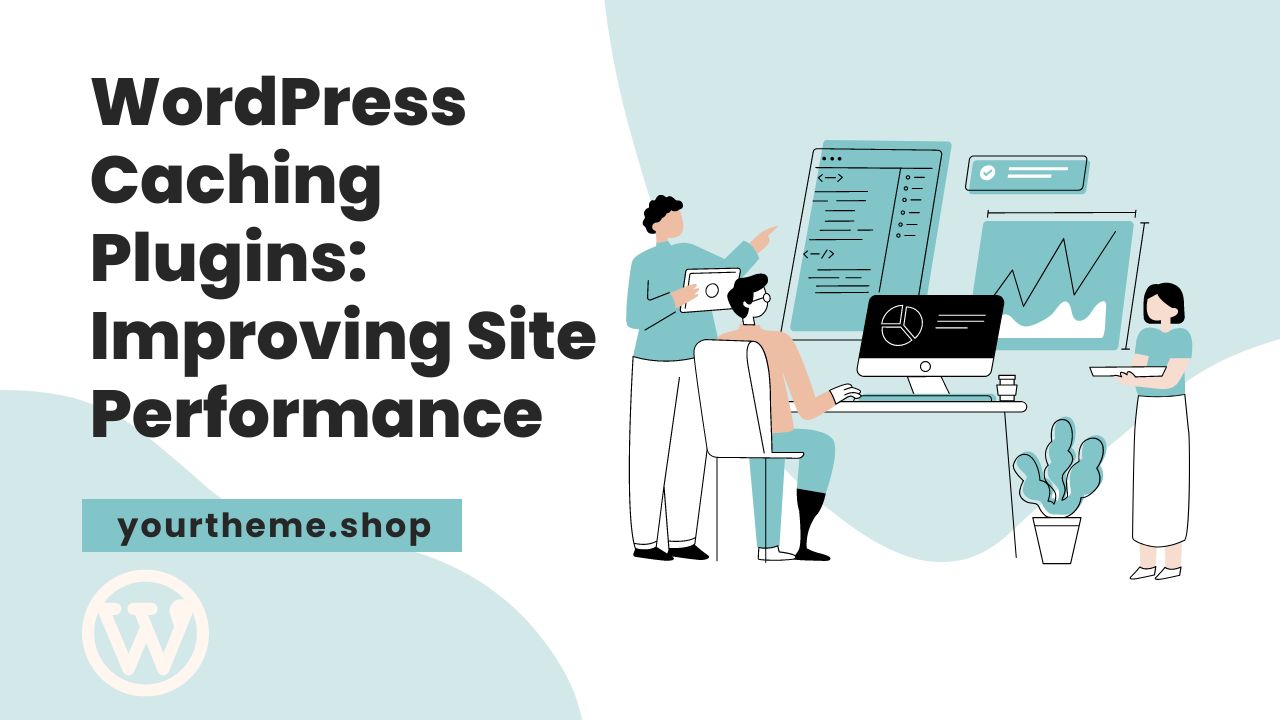In the WordPress Caching Plugins Improving Site Performanceever-evolving world of web development, ensuring a fast and responsive website is paramount. A sluggish website not only frustrates visitors but can also have a negative impact on search engine rankings. Fortunately, WordPress offers a solution in the form of caching plugins. In this article, we’ll delve into the world of WordPress Caching Plugins and explore how they can significantly improve your site’s performance.
Understanding the Importance of Site Speed
Before we dive into caching plugins, let’s first understand why site speed is crucial:
Keyword: WordPress Caching Plugins: Improving Site Performance
- User Experience: Visitors expect websites to load quickly. A slow site can lead to high bounce rates and dissatisfied users.
- SEO Rankings: Search engines, including Google, consider site speed as a ranking factor. Faster sites tend to rank higher in search results.
- Conversion Rates: A faster website often translates into better conversion rates. Whether it’s making a purchase or signing up for a newsletter, users are more likely to take action on a fast site.
Configuring Caching Plugins for Optimal Performance
Keyword: How to configure caching plugins in WordPress for optimal performance
Now, let’s get into the nitty-gritty of how caching plugins work and how to configure them for optimal performance:
What is Caching?
Keyword: WordPress Caching Plugins: Improving Site Performance
In the fast-paced digital landscape, website performance is a make-or-break factor. Slow-loading websites can deter visitors and negatively impact your search engine rankings. This is where caching comes into play.
Understanding Caching
Keyword: WordPress Caching Plugins: Improving Site Performance
Caching, in its essence, is the art of temporarily storing frequently accessed data. For WordPress users, caching plugins are like wizards that transform your dynamically generated web pages into static HTML versions. This transformation significantly reduces the server’s workload by eliminating the need to generate pages anew for every single visitor.
The Role of Caching Plugins
Keyword: WordPress Caching Plugins: Improving Site Performance
Caching plugins play a pivotal role in enhancing your site’s performance and speed. Here’s how they work their magic:
Static HTML Generation
Keyword: How to configure caching plugins in WordPress for optimal performance
When a user visits your WordPress site, a caching plugin swiftly steps in. It creates a static HTML version of the requested page, essentially freezing it in time. This static HTML version is then served to subsequent visitors, sparing the server from reprocessing the same page over and over again.
Reducing Load Times
In today’s digital landscape, website speed is a paramount factor that can make or break the user experience. Slow-loading websites can lead to higher bounce rates and, subsequently, lower search engine rankings. WordPress, being one of the most popular content management systems, offers a lifeline in the form of caching plugins. In this article, we’ll delve into the world of WordPress Caching Plugins: Improving Site Performance and explore how they can effectively reduce load times, enhancing the overall browsing experience.
The Significance of Load Times
Before we dive into caching plugins, it’s essential to grasp why reducing load times is of utmost importance:
Keyword: WordPress Caching Plugins: Improving Site Performance
- Enhanced User Experience: Visitors to your website expect swift page loading. Caching plugins help meet this expectation, resulting in a more satisfying browsing experience.
- SEO Benefits: Search engines, including Google, consider site speed as a ranking factor. Faster-loading websites tend to rank higher in search results.
- Higher Conversion Rates: Faster websites often lead to improved conversion rates. Whether it’s making a purchase or signing up for a newsletter, users are more likely to take action on a fast site.
Leveraging Caching Plugins for Speed
Keyword: How to configure caching plugins in WordPress for optimal performance
Now, let’s delve into the mechanics of caching plugins and how to configure them for optimal site performance:
Understanding Caching
Caching is the practice of storing frequently accessed data temporarily. In the WordPress context, caching plugins generate static HTML versions of your web pages, reducing the need for the server to generate dynamic pages for each visitor.
Selecting the Right Caching Plugin
Keyword: Comparing top WordPress caching plugins for site speed improvement
Not all caching plugins are created equal. Here are some renowned options to consider:
W3 Total Cache
- Pros: Offers an array of caching methods, seamless CDN integration, and browser caching options.
- Cons: Configuration may be intricate for beginners.
WP Super Cache
- Pros: User-friendly and suitable for novices, generates static HTML files efficiently.
- Cons: Offers fewer advanced options compared to some other plugins.
WP Rocket
- Pros: Exceptionally user-friendly with top-notch customer support, integrates seamlessly with popular CDNs, and provides advanced optimization features.
- Cons: Premium plugin with associated costs.
Configuring Your Caching Plugin
Once you’ve chosen a caching plugin, it’s crucial to configure it correctly:
- Page Caching: Enable page caching to create static HTML versions of your pages.
- Browser Caching: Leverage browser caching to instruct visitors’ browsers to store specific files, reducing load times on subsequent visits.
- Minification: Minify your HTML, CSS, and JavaScript files to reduce their size and enhance loading speed.
- CDN Integration: If you use a Content Delivery Network (CDN), ensure seamless integration with your caching plugin for optimized performance.
Comparing Top WordPress Caching Plugins
Keyword: Comparing top WordPress caching plugins for site speed improvement
Now, let’s take an in-depth look at the leading caching plugins and what sets them apart:
W3 Total Cache
- Pros: Offers a plethora of caching methods, integrates smoothly with CDNs, and provides comprehensive browser caching options.
- Cons: Configuration can be complex for novices.
WP Super Cache
- Pros: User-friendly and suitable for beginners, swiftly generates static HTML files.
- Cons: Limited advanced options compared to other plugins.
WP Rocket
- Pros: Exceptionally user-friendly with exceptional customer support, seamless integration with renowned CDNs, and advanced optimization features.
- Cons: Considered a premium plugin with associated costs.
Caching Solutions for High-Traffic Websites
Keyword: WordPress caching solutions for high-traffic websites
For high-traffic websites, caching solutions become even more critical. Here are some strategies to consider:
- Dedicated Hosting: Explore dedicated hosting or managed WordPress hosting, often including server-level caching for improved performance.
- Object Caching: Implement object caching to store frequently used database queries, further alleviating server load.
- Content Delivery Network (CDN): Utilize a CDN to distribute your website’s assets across multiple servers globally, reducing latency and elevating loading speeds.
Search Engine Favor
Keyword: WordPress Caching Plugins: Improving Site Performance
Search engines, such as Google, favor fast-loading websites. By improving your site’s speed through caching, you’re also improving its chances of ranking higher in search results.
Configuring Caching Plugins
Keyword: How to configure caching plugins in WordPress for optimal performance
Configuring caching plugins for optimal performance is a crucial step in the process. Let’s break it down:
Plugin Selection
Keyword: Comparing top WordPress caching plugins for site speed improvement
Choosing the right caching plugin is akin to selecting the perfect tool for a task. Here are some options to consider:
W3 Total Cache
Keyword: Comparing top WordPress caching plugins for site speed improvement
- Pros: Offers various caching methods, integrates with Content Delivery Networks (CDNs), and provides browser caching options.
- Cons: Configuration can be complex for beginners.
WP Super Cache
Keyword: Comparing top WordPress caching plugins for site speed improvement
- Pros: User-friendly and suitable for beginners, generates static HTML files quickly.
- Cons: Offers fewer advanced options compared to other plugins.
WP Rocket
Keyword: Comparing top WordPress caching plugins for site speed improvement
- Pros: Extremely user-friendly, excellent customer support, seamless integration with popular CDNs, and advanced optimization features.
- Cons: It’s a premium plugin with associated costs.
Configuration Essentials
Keyword: How to configure caching plugins in WordPress for optimal performance
Once you’ve chosen your caching plugin, it’s time to configure it. Here are some key elements to address:
Page Caching
Keyword: How to configure caching plugins in WordPress for optimal performance
Activate page caching to generate static HTML versions of your pages.
Browser Caching
Keyword: How to configure caching plugins in WordPress for optimal performance
Leverage browser caching to instruct visitors’ browsers to store certain files, reducing load times on subsequent visits.
Minification
Keyword: How to configure caching plugins in WordPress for optimal performance
Minify your HTML, CSS, and JavaScript files to reduce their size and improve loading speed.
CDN Integration
Keyword: How to configure caching plugins in WordPress for optimal performance
If you use a Content Delivery Network (CDN), ensure seamless integration with your caching plugin to enhance content delivery.
Selecting the Right Caching Plugin
Not all caching plugins are created equal. Here are some popular options to consider:
Keyword: Comparing top WordPress caching plugins for site speed improvement
- W3 Total Cache: A comprehensive caching plugin that offers various caching methods and optimization features.
- WP Super Cache: A user-friendly plugin that generates static HTML files for your WordPress site.
- WP Rocket: Known for its ease of use, WP Rocket is a premium caching plugin with advanced optimization options.
Configuring Your Caching Plugin
Once you’ve chosen a caching plugin, it’s essential to configure it correctly:
- Page Caching: Enable page caching to create static HTML versions of your pages.
- Browser Caching: Leverage browser caching to instruct visitors’ browsers to store certain files, reducing load times on subsequent visits.
- Minification: Minify your HTML, CSS, and JavaScript files to reduce their size and load faster.
- CDN Integration: If you use a Content Delivery Network (CDN), ensure it’s integrated with your caching plugin for improved performance.
Comparing Top WordPress Caching Plugins
Keyword: Comparing top WordPress caching plugins for site speed improvement
Let’s take a closer look at the top caching plugins and what sets them apart:
W3 Total Cache
- Pros: Offers a wide range of caching methods, integrates well with CDNs, and provides browser caching options.
- Cons: Configuration can be complex for beginners.
WP Super Cache
- Pros: User-friendly and suitable for beginners, generates static HTML files quickly.
- Cons: Limited advanced options compared to other plugins.
WP Rocket
- Pros: Extremely user-friendly with excellent customer support, integrates seamlessly with popular CDNs, and offers advanced optimization features.
- Cons: Premium plugin with a cost associated.
Caching Solutions for High-Traffic Websites
Keyword: WordPress caching solutions for high-traffic websites
If you run a high-traffic website, you may have unique caching needs:
- Dedicated Hosting: Consider using dedicated hosting or managed WordPress hosting, which often includes server-level caching.
- Object Caching: Implement object caching to store frequently used database queries, further reducing server load.
- Content Delivery Network (CDN): Utilize a CDN to distribute your website’s assets across multiple servers globally, reducing latency and improving load times.
In summary, WordPress caching plugins are essential for improving site performance, enhancing user experience, and boosting SEO rankings. Choose wisely, configure diligently, and enjoy faster websites






